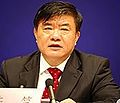Barefoot doctor
Barefoot doctor refers to a type of health care provider who was part of a national healthcare initiative in the People's Republic of China, starting in the late 1960s and continuing into the 1970s. The program aimed to address the scarcity of professional healthcare in rural areas by training farmers with basic medical skills and knowledge in traditional Chinese medicine (TCM) and preventive healthcare. These individuals, known as "barefoot doctors," played a crucial role in improving health outcomes in rural Chinese communities.
History
The barefoot doctor program was a component of the Cultural Revolution's broader effort to promote healthcare accessibility and integrate Western and Chinese medicine. The term "barefoot" was symbolic, reflecting the program's focus on rural peasants who often worked barefoot in the fields. The initiative was part of China's attempt to meet the Declaration of Alma-Ata's goals, which emphasized health as a fundamental human right and called for the development of primary healthcare as a means to achieve "Health for All."
Training and Responsibilities
Barefoot doctors underwent short, intensive training sessions that covered a range of topics, including basic Western medicine, traditional Chinese medicine, midwifery, and epidemiology. Their education emphasized practical skills and preventive measures, enabling them to treat common illnesses, administer vaccinations, and provide basic maternal and child healthcare services.
In addition to their medical duties, barefoot doctors were responsible for educating their communities about public health practices, such as sanitation, nutrition, and family planning. They played a key role in the dissemination of health information and the promotion of healthy lifestyles.
Impact
The barefoot doctor program significantly improved healthcare accessibility in rural China, contributing to notable improvements in public health indicators, including a reduction in the prevalence of infectious diseases and an increase in life expectancy. The program also served as a model for similar initiatives in other developing countries, highlighting the potential of community-based healthcare delivery systems.
Decline and Legacy
In the early 1980s, with economic reforms and the introduction of market principles into the healthcare system, the barefoot doctor program began to decline. The shift towards a fee-for-service model eroded the foundation of the program, leading to a decrease in the number of barefoot doctors and an increase in healthcare disparities between urban and rural areas.
Despite its decline, the legacy of the barefoot doctor program endures. It demonstrated the effectiveness of integrating traditional and Western medicine and highlighted the importance of community health workers in improving access to healthcare. The program's principles continue to influence public health strategies, particularly in resource-limited settings.
See Also
Transform your life with W8MD's budget GLP-1 injections from $125.
W8MD offers a medical weight loss program to lose weight in Philadelphia. Our physician-supervised medical weight loss provides:
- Most insurances accepted or discounted self-pay rates. We will obtain insurance prior authorizations if needed.
- Generic GLP1 weight loss injections from $125 for the starting dose.
- Also offer prescription weight loss medications including Phentermine, Qsymia, Diethylpropion, Contrave etc.
NYC weight loss doctor appointments
Start your NYC weight loss journey today at our NYC medical weight loss and Philadelphia medical weight loss clinics.
- Call 718-946-5500 to lose weight in NYC or for medical weight loss in Philadelphia 215-676-2334.
- Tags:NYC medical weight loss, Philadelphia lose weight Zepbound NYC, Budget GLP1 weight loss injections, Wegovy Philadelphia, Wegovy NYC, Philadelphia medical weight loss, Brookly weight loss and Wegovy NYC
|
WikiMD's Wellness Encyclopedia |
| Let Food Be Thy Medicine Medicine Thy Food - Hippocrates |
Medical Disclaimer: WikiMD is not a substitute for professional medical advice. The information on WikiMD is provided as an information resource only, may be incorrect, outdated or misleading, and is not to be used or relied on for any diagnostic or treatment purposes. Please consult your health care provider before making any healthcare decisions or for guidance about a specific medical condition. WikiMD expressly disclaims responsibility, and shall have no liability, for any damages, loss, injury, or liability whatsoever suffered as a result of your reliance on the information contained in this site. By visiting this site you agree to the foregoing terms and conditions, which may from time to time be changed or supplemented by WikiMD. If you do not agree to the foregoing terms and conditions, you should not enter or use this site. See full disclaimer.
Credits:Most images are courtesy of Wikimedia commons, and templates, categories Wikipedia, licensed under CC BY SA or similar.
Contributors: Prab R. Tumpati, MD







